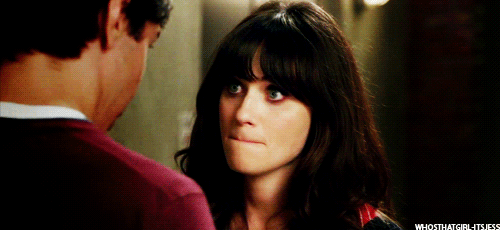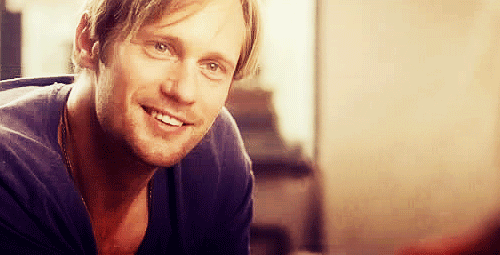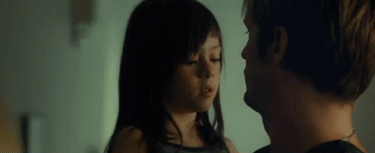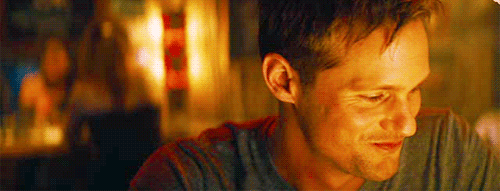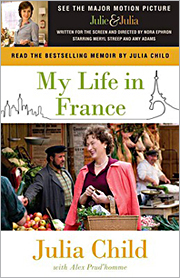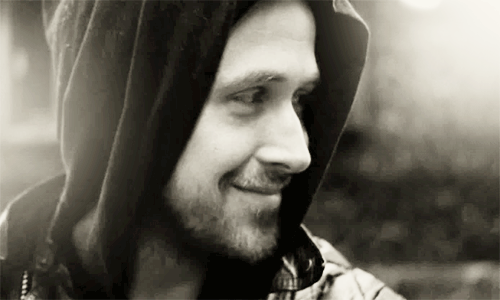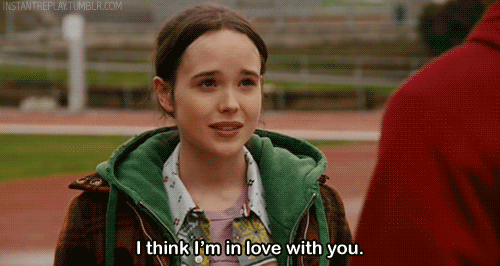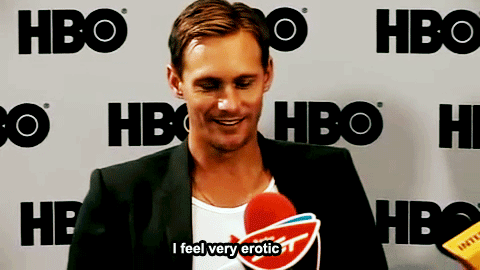Oh hey guys, remember when I read What Maisie Knew this summer because I was like 'there's a film! Skarsgard is in it!' and then I didn't see the film because it wasn't released anywhere and now it's December?
Well, that happened, but it's all ok because (US) Netflix came through for me like it so often does, and has it on there now (i.e. you can watch it toooo! If, you know, I can convince you to do so) so I watched it one quiet Sunday evening when I probably should have been sleeping. But, whatever, sleep can wait.
So, if you're an avid reader of this here blog (I know you ALL are, so well done for having fabulous taste) you'll remember that, after reading What Maisie Knew, I decided it would work really really well updated to modern times, and guess what? I was right! Shocking, I know. So, moved from 19th Century London to 21st Century New York, stripped of all that unnecessary language James uses, and involving certain Swedish Gods, What Maisie Knew really comes into its own.
But don't get me wrong- What Maisie Knew is still all about what Maisie knows. Onata Aprile who plays Maisie is in every single scene of the movie, and if she doesn't see it, then we don't see it either. As in the book, this can sometimes be frustrating because WHAT EXACTLY HAPPENED BETWEEN MAISIE'S TERRIBLE MOTHER AND LINCOLN?! but that's kind of the point of the story- when you're a child, things that adults do are confusing, and sometimes a mystery, and you don't always get the full story of what went on because no one ever thinks to explain it to you.
DAMN, it's hard being a kid.
Anyway. So Onata Aprile is amaaaaazing. I was pretty sure she was going to be, because everything I've read about the film has said 'Onata Aprile is amazing', and that many people can't be wrong (usually). But really- I don't know if she even knew what she was doing, or if she's just blessed with an incredibly expressive face, but damn that kid can emote. She makes it so easy to feel for her because every single thing she's feeling is written all over her face, and it's pretty wonderful to watch.
AND (I thought I was done with the kid, but apparently not) she's never annoying in the way that some children are kind of annoying. She's never too whiny, or wimpy, or tantrumy, or anything like that, but instead she just tries to deal with all the new and different things that are thrown at her as a result of her parents' divorce in the calmest and almost dignified way possible. It feels weird to call a six year old dignified, but that's kind of how she is- she's a child who's used to being alone, waiting for her parents' attention rather than demanding it, and that in itself is kind of heartbreaking to watch.
Let's see, there were other people in the film, I guess... Well, Julianne Moore was awesome because she's Julianne Moore, and she made me dislike her character the perfect amount, so that I could still feel sorry for her when she wanted Maisie's attention, even though that wasn't really something she deserved. Steve Coogan annoys me in general, but he wasn't in the film that much and definitely wasn't supposed to be likable, so that's fine. Joanna Vanderham was also really likeable as Maisie's nanny-turned-stepmother, and it was difficult not to feel for her as the woman duped into marrying this guy who isn't nearly good enough for her, so, I don't know, he didn't have to pay her to look after his child?
I feel like I'm missing someone out, who can that be?
Oh, Skarsgard. I don't think I've seen him in anything before where he's being all adorable and responsible and child rearing, and I have to say, I LIKE it. I would say that it made my ovaries ache but that expression is BULLSHIT and eurgh. But, let's just say I would totally have his babies (obviously...) but now I can totally imagine that we raise them together and it's beautiful. AHEM. So basically, he's really sweet and lovely, his onscreen (and, actually, offscreen) chemistry with Onata is so lovely to watch, and the uniform he wears to be a bartender is so incredibly hot that I can barely look at him while that's happening. Ahem.
The point! You should probably watch this. If nothing else, it's beautiful to look at, but also? Everything else. All of the other parts. They're good. It stays close enough to James's novel that you can't accuse it of taking liberties, but goes far enough away from it to stand on its own and, actually, be better than the book (in my extremely unbiased opinion). As always, what Maisie knows isn't enough to stop her from getting hurt, but what I know is that this film is pretty great and I know I'll be watching it again.
Showing posts with label Aren't obsessions amazing. Show all posts
Showing posts with label Aren't obsessions amazing. Show all posts
Monday, 9 December 2013
Monday, 29 July 2013
Devouring Films: The East
Before I talk about The East, it's pretty important that I talk about Brit Marling's hoodie in The East:
I LOVE IT and it is now my mission in life to get an inexpensive black hoodie, sew some lace onto it and wear it with the hood up all winter. Hey, we've all got to have dreams. And it'll look FAB with my other mission to join an eco-terrorist group and stick it to the corporations and stuff.* YEAH!Now. The real deal about The East. OBVIOUSLY I really only wanted to see it because Alexander Skarsgard is in it (I know, I know, YAWN) but but but (and this is important) I wouldn't just like it for that reason. Like, I might watch it more than once for that reason because, you know, YUM, but in the end, I'm not going to say I like a film if I don't, no matter who's in it. It's because of this I could be SO scathing about The Astronaut's Wife (and I am crazy about Johnny Depp) and part of the reason I didn't even bother writing a review for the Straw Dogs remake that Skarsgard was also in (the other reason is laziness. But I really didn't like it.)
And you know what? I liked The East. I really did. It was one of those times where, leaving the cinema on a Skarsgard high, I wasn't entirely sure how I felt about the movie aside from that part where Skarsgard was in the bath and... Other parts, but a few days later when I found myself thinking about some of the issues actually explored in the film, it suddenly clicked and Ah! I did like the film for its storyline and things aside from stellar casting decisions! Which is honestly a relief to know.
So, the story. The East starts and ends with Brit Marling's character, Sarah, and it's really all about her journey- an ex-CIA (FBI? I forget) operative, now working for an actual private company as an undercover agent whose job is to infiltrate The East- a left wing group that targets evil corporations to try and repay them with some measure of the things they've done to others. Even though Sarah completely disagrees with some of their methods, she comes to sympathise with their aims and to question everything she once thought was true about the world and about her life.
And that's just the core of the film, and surrounding that is The East itself. Kiiiind of led by the charismatic (read: beautiful) Benji (Skarsgard) and all gathered around the same goals and a commitment to a certain (read: communal, hippy-esque) way of life, they're kind of a beautiful group. There are people of almost every ostracised group in society represented, and as you learn more about certain characters, their motives for wanting to be a part of such a group become increasingly clear- and sometimes in heartbreaking ways.
For what it's worth, I kind of loved them all- even though I definitely have some issues with their methods, I have incredible empathy and love for basically all of them, and you know what, let's just say it, I totally get where they're coming from. The people behind corporations are almost NEVER held responsible for their actions, purely because they have 'The Corporation' to hide behind, and it's kind of disturbing to realise the things they can get away with. (I don't know how much, or if any of the stories told in The East are true, but I know enough about such things to know that they very easily could be). The East are really just trying to balance the scales here, and can I blame them for it? Not really.
Slight feminist moment- This film didn't even need to try to pass The Bechdel Test because there were plenty of women in the group, the lead character is a woman and, imagine this, she's a woman who has more on her mind than finding a man to marry her! GASP! (Whether or not this is because she's already engaged is neither here nor there). It's actually refreshing to realise you've just watched a film where, for example, Sarah and Izzy (Ellen Page) haven't had a conversation about who likes Benji more, and where as a group they talk about things that actually matter as opposed to who's sleeping with who (my own thoughts: everyone is either sleeping with, or want to sleep with, Benji. But I would say that). I attribute most of this to Brit Marling being one of the writers, and I love her for it and now I kind of want to watch everything she's done? Yeah, that.
On reflection, then, I liked The East for more things than Skarsgardian abs, and that's about the highest praise I can give a movie. It's the first movie for a long time I can remember even thinking about for longer than about 5 minutes, and it's way smarter than it needs to be, but not so smart that it becomes inaccessible. And if you don't like gender equality in your cults then I don't know what to do with you.
*Shit, people like monitor the internet, right? I'm totally kidding, scary Government types! I'd never break laws and stuff! Unless someone really pissed me off, that is...
Wednesday, 24 July 2013
Devouring Books: What Maisie Knew by Henry James
"What was clear to any spectator was that the only link binding her to either parent was this lamentable fact of her being a ready vessel for bitterness, a deep little porcelain cup in which biting acids could be mixed. They had wanted her not for any good they could do her, but for the harm they could, with her unconscious aid, do each other."
Before I tell you all about What Maisie Knew, I have to tell you What Laura Knew- namely that a movie version is coming out in August (a mere month away!) starring the rather dashing Alexander Skarsgard (and there are probably some other people in it too, I don't know) that I've known I wanted to see for about a year. So, when Penguin did one of their 50% off sale things at Christmastime last year, I snapped up a copy of What Maisie Knew and intended to read it straight away.
Six months later, I finally picked it up, and now I have read it! *Pauses for applause* And a whole month before the movie comes out, too. I'm calling that a win! I've read some Henry James before (The Europeans, The Turn of the Screw) and I liked them fine, but both of those are shorter than What Maisie Knew, so I didn't really know what to expect. Actually, that's not true- I thought I did know what to expect, but what I got was something else entirely and it maybe wasn't as... Good as I thought it was going to be.
Ok, here's what I'm really dancing around- I don't really like James's writing style. His sentences are never ending and sometimes seem to have overused the Thesaurus function in Word (just like 'Baby Kangaroo' Tribbiani*) even if Word didn't exist until about 100 years after Maisie was written. I could feel myself rushing through sentences and paragraphs because there were just. So many. Unecessary words. I don't like to rush through books in such a way so DAMMIT JAMES, no. And I don't know if this is just a personal 'Laura can't read big words' thing, or if this is a legitimate criticism of James's work, but if it's how I feel then it IS legitimate so there.
Let's put the actual writing aside for juuuust a minute, because there were things about the book that I actually did like. I liked how modern the story felt- parents getting divorced and using their child as ammunition feels like something that maybe didn't happen so much in 1897, but I'm willing to bet it happens a lot more now OR, at least, there are more opportunities for it to happen now. I also liked (and this is kind of the selling point of the whole selling point of the book) how the story is told through Maisie's eyes, which doesn't mean we get a childlike rendition of events, but more that 'What Maisie Knew' is ALL we know. It's clear that many, many things are happening when she's not there, but it's pretty much up to the reader to decide on the exact nature of said things, which means you keep thinking beyond the lines of the narrative. Which I like. Obviously.
And then, there's Sir Claude. Can we just pause for a moment and appreciate this description of him:
"She felt the moment she looked at him that he was by far the most radiant person with whom she had yet been concerned."
Oh, RADIANT, you say?
Ok, bad example. But YES Sir Claude's modern equivalent is Skarsgard and it seems sooort of like perfect casting. But anyway- I don't love Sir Claude because of his radiance OR the fact that I pictured him as tall, blonde and hot as fuck, but because, of all the adults in Maisie's life, he seems to be the one who is best for her, and who does the most for her. And this doesn't mean that he denies all his own urges for Maisie's sake (because he doesn't) but just that he loves her the best/at all, and that's really what she needs. And, as her stepfather, he's not even obligated to do anything for her, really, and yet he still manages to give her more positive attention than her mother and father combined.
We shan't talk about the part where he sort of takes her to France without her parents' permission because I'm sure that was way less classified as kidnapping 100+ years ago. And besides, I don't think her parents cared where she was...
Ahem. But anyway, Maisie and Sir Claude really seem like two good eggs (well- it remains to be seen even by the end of the book whether or not Maisie has been ruined by her parents' shenanigans, and I'm inclined to think she might have been...) in a sea of selfish and/or hateful characters. Even the nannies Maisie has with her respective parents are locked in a ridiculous feud that seems to only increase the damage to Maisie, and is just another reason that Sir Claude seems to be the best for her. Plus, there's his damn radiance, and everything...
Aside: On how excited I am for the movie- I'm really excited. And NO, not just for Skarsgard, you perverts. Nope, when I was reading, I was excited because I could see exactly how this could be adapted for a modern situation, mostly because it's already a modern situation, and kind of fits today's time better than its own. And I know that I potentially love a lot of the changes the film has made- like how Maisie's parents are both people with Big Careers, which is why they hardly ever see her, and how Sir Claude (who, we assume, marries Maisie's mother for her money) is a bartender who her mother pays to look after her and HEY see how that works? Also, he's still radiant. So there's that.
So. There's no ignoring the fact that I don't like James's style *nervously eyes The Portrait of a Lady and The Bostonians and why do I have so many books by Henry James, again?* BUT in this case I'm willing to overlook that because I do really like the story that I had to speed read to get through. If a different writer had been involved, I might have LOVED it, but they weren't so I'll take what I can get. Maybe most importantly, it's gotten me all excited for the movie, which was my main reason for reading it in the first place and I can't really ask for anything more than that, can I?
*Don't even TELL me that you don't come here to read Henry James being compared with Friends because I KNOW YOU DO
Tuesday, 9 July 2013
Devouring Books: My Life in France by Julia Child
"This is my invariable advice to people: Learn how to cook- try new recipes, learn from your mistakes, be fearless, and above all have fun!"
I love Julie and Julia (the movie... Although come to think of it, the book too!) so so much and it was only a matter of time before I read book that formed the basis of the 'Julia' part of the movie to complete the circle of Julie and Julia excellence. I didn't really know what to expect- the Julia parts of the movie seemed to mostly concentrate on Julia Child's cooking life (which makes sense) and this book seemed way longer than that. Still, I strode onwards into the unknown, and... you know, read the book.
And my God. It was such a treat. I just... I feel like Julia Child is pretty well known in America even now (I could easily be wrong) and I had literally never heard of her before I watched Julie and Julia, so that was all I had to go off of in terms of her personality and ideas and way of speaking (or, you know, writing, in this case) and I'm sure Meryl Streep did her right, but somehow Julia seemed even... MORE in this book. More charming, more lovely, more cheerful, more optimistic and positive, just a whole lot MORE than anything I had expected of her. I mean, shit you guys, I think I kind of love her?
So here's the deal with this book. The first half is pretty much the 'Julia Child story' as presented in the movie- Julia and Paul Child move to France, she decides to learn how to cook, sets up her own cooking classes and writes a cookbook. It's all pretty great, and Nora declined to mention that she ALSO became fluent in french (in the movie she's shown as being constantly a bit hopeless at it) AND that she maybe wasn't so desperate for a baby as the movie makes her out to be (BAD Nora). But also, it's even BETTER than it is in the movie because there are all these extra stories and anecdotes and things that just make a whole life rather than serving the agenda for a movie storyline (I mean, I get that it's necessary! I'm just trying to make it clear that the book is excellenter).
And then there's the second half of the book which has become one of my favourite things from anything ever. Here's the thing: Julia Child was 49 years old when Mastering the Art of French Cooking was published. This was really the point where her career took off (and it's what the second half of this book mainly focuses on) and where she became kind of the family breadwinner as Paul considered retirement. Her TV show, the French chef debuted when she was 51. I can't even begin to tell you how comforting this is to me, but I'll try. I feel like we live in a time when there's a pressure to do everything when you're young, and in fact where age is considered a complete disadvantage and the young are kind of put up on a pedestal (think about this: The President of the USA was 47 when he came into office. The UK Prime Minister is under 50. This never used to happen, right?)
And the thing is, I know I can't just time travel back to the late forties and early fifties (and I wouldn't really want to) but it's still so soothing to read that this woman, at the age of 36 when this book begins, still doesn't know what she wants to do with her life. It gave me some kind of... I don't know if hope is the right word, but just the idea that it's ok to not always know what you want to do, and that, if you're really lucky, you get to figure out what it is at some point and everything will be awesome. I'm not expecting to be a famous tv chef, I hasten to add, but reading about the success of someone who didn't even start being successful (at least professionally) until she was 49 really does give me, yeah, ok I'll say it, hope.
Also she gave me the dream of living in Provence in a little house with my imaginary husband (Skarsgard, natch) just down the road from Frances and her imaginary husband (Henry Cavill) where we all laugh and talk and Frances and I write books together and drink and also eat food and stare at our imaginary husbands. This led to a very fun afternoon of daydreaming and I have just realised that I sound insane SO I hasten to add that this is what Julia and Paul Child did with Simone Beck (co-author of Mastering the Art...) and her husband. And it. Sounds. So. Awesome. And is definitely an important part of my future success, even if the South of France has become totally commercialised and probably spoilt now. It's still a lovely dream.
So yeah. Apparently I've just gone on about why this book was good for me (come on, I do that all the time, and you know it!) but it really really is great- like an even better version of Julia Child than even Meryl Streep could give us (I KNOW) and time well spent in the company of a lovely lovely person. Who could ask for anything more than that from a book?
Tuesday, 11 June 2013
Devouring Books: Les Miserables by Victor Hugo
"Nothing can be sadder or more profound than to see a thousand things for the first and last time. To journey is to be born and die each minute."
You might have noticed if you've spent any time around my blog for, oh, all of this year, that I've become sort of... Ok, yeah, obsessed with Les Miserables. What started with the movie (I saw it TWICE at the cinema, which I basically never do with films anymore because dude, the cinema is expensive) culminated (NOT ended) a couple of weeks ago in seeing the musical in London, and in between the two was an epic, four month long battle with the book.
That's right, I said battle. This is not an easy book to read both in terms of there just being SO much in it that's good that you kind of don't want to miss anything, but then also there being so much in it that's irrelevant to the main story that I might have spent a lot of time reading at it SCREAMING at Hugo in my brain to just GET BACK TO THE STORY DAMMIT. I feel like this might be a hazard of having watched the film first, in that I cared so much about the characters that I wanted the whole book to just be about them (which, to be fair, isn't an unreasonable ask!) but then the flipside of that is, if I hadn't seen the film first, I'm not sure if I would even have finished the book. It's a harsh but true reality that, every time I picked the book back up after weeks away from it, it was with the knowledge that the movie wasn't out on DVD yet, and I was too poor to see the show.
Now. This doesn't mean that the movie/musical is the only good form of Les Miserables, and so you should just skip the book. No, on the whole I'm going to have to say that the rewards of Les Miserables are infinitely greater than having to skim read a MILLION pages about the Battle of Waterloo, or the Parisian sewer system (!). Although the book would be far far better if Hugo had allowed it to be edited properly (I think then, I could have called it one of my favourite books), the things it has added to my overall idea-in-my-brain of Les Miserables I wouldn't be without. But I give you permission to skip anything you think is irrelevant, because *whispers* it probably is.
See, see how long this is getting already? I don't even know where to go from here, because this book is EPIC, you guys, not just in, you know, length, but also in the number of Things it covers. Just off the top of my head, I'm thinking history, politics, religion, social issues, love, hate, justice (or the lack thereof), youth, morality- almost everything you can think of is right there in it, and that's just for starters, because what it also has are characters that are so complex that I'm still trying to figure them out now, and stuff that happens that is engaging and exciting and that I have Feelings about. So let me just... I'm going to say some things and they'll hopefully make sense and if not then I still need to say them, apparently. So yeah.
Firstly- Even though the massive rambling story deviations were pretty awful, there were extra things about the book that I did love, which were, basically, anything that was directly to do with the actual story. Reading the book means that you find out more about the kindly Priest (he's really awesome, by the way), little Gavroche! (ditto) and, possibly the thing I was most interested in reading about, how Fantine got into her, y'know, situation. Also, there were things that happened that the musical just really doesn't have time for, and they're still exciting- for example, at one point Jean Valjean is almost buried alive and my heart was in my throat the whole time. If I'm honest, I really just used the book to enhance the musical and the way I think about the characters in it, and... It really lived up to that task.
Nextly- I know I've mentioned already that I'm still trying to figure out the characters, but the book makes me feel like I'm nearly there. I got so much more from it than the musical shows, character-wise (as is natural) and I feel like I'm that much closer to understanding Javert and his INSANE conformity to The Law and to just how well that contrasts with Jean Valjean and his sense of justice having to fit appropriately to the situation, otherwise it really isn't justice at all. These two men, in fact, are probably the two most interesting characters to me, possibly because they contrast so well with each other.
Also notable- I feel like it's really natural to find Marius and Cosette kind of annoying because they're the only characters who kind of get everything they ever wanted (each other) and, in fact, the whole of Part Three ('Marius') feels kind of like a deviation from the story because it moves things on about one song's worth. But the thing about the two of them is that if they weren't in the story then it would pretty much make you want to kill yourself, and without them and their love, Hugo wouldn't be able to say things like this:
"There is no joy outside the ecstasy of love. The rest is tears. To love or have loved is all-sufficing. We must not ask for more."And- In spite of my frequent frustration towards Hugo, I feel like I also kind of love him? From a view of religion that isn't overly strict and is more based on kindness, and not even that, just the situation instead of some pre-ordained rules, than any religion that actually exists, to lamenting the fate of women who are forced into prostitution (FANTINE! Dear God, Fantine) and so so so many more progressive social views that make me want to give him a hug. If I'm allowed to see all the goodness that exists in Jean Valjean's actions as telling me something about Hugo, then I'm pretty much going to say
LET ME EDIT YOUR BOOK.
Slight backtracking- I know that I've said that the deviations are what stop this book from going from a good book to a GREAT one, but there are some exceptions to this. There were parts in the deviations that made me sit up and feel all shocked, and also made me feel vaguely sorry for not reading all of them properly, because what if the really really good bits were tucked up inside of them? Like this stunning piece of optimism:
"Our nineteenth century is great, but the twentieth century will be happy. Nothing in it will resemble ancient history. Today's fears will all have been abolished- war and conquest, the clash of armed nations... the birth of hereditary tyrannies, nations partitioned by a congress or the collapse of a dynasty, religions beating their heads together like rams in the wilderness of the infinite...One might almost say, indeed, that there will be no more events. Men will be happy."I like to picture Hugo writing this and truly believing it, and it makes me kind of glad that he never lived in the twentieth century. No more wars? No religious conflict? Happiness?! He couldn't have been more wrong about the twentieth century, but it's nice to know that there existed in him, as I think exists in all of us, the belief that things can be better in the future- otherwise, I guess, what's the point in living at all?
My love- is reserved for Enjolras specifically, and the revolutionaries in general. Had I been a male in Paris at the time of the June Revolution, I'd like to think I'd have been one of them, and if I'd been a woman I'm sure I'd have been hopelessly in love with a revolutionary. The musical makes it clear that Enjolras is not interested in love at all, but the book cements that with the information that he only bestows two kisses in his life, both on the body of a fallen comrade. Hot.
And finally- in my extensive research for this extensive post, I found out that, re: the musical, "Literary scholars condemned the project for converting classic literature into a musical." And I'm just... I mean, I'm assuming that's before they saw the musical, because I can't even stand the thought that anyone who's read Les Miserables could watch that and go 'yeah, but they missed out the SEWER EXPLANATION.' But even so, that still doesn't give any credit to the incredible emotional power that music has, and how well it can be used especially in this book, to pick out its tragedies and triumphs and really make you feel things about stuff. Because that's entirely what the musical does and it's fucking magical and literary scholars can just shut up if they think that it doesn't.
I realise that this post is a hot mess, and makes absolutely no sense if you're not at all familiar with Les Miserables, but this was really the only way I could write it- I don't know how to talk about things I love so much in any kind of sane way, so this is all I have (well, not all, but I don't like to GO ON, or anything). And I wish I was sorry, but I'm kind of not because this was the thing I wanted to write about it, and now I have and that's good enough for me! And I included gifs to try and keep you entertained, so pretend that worked, ok?! And go and experience Les Mis in some way, yes? It's kind of my favourite thing.
Subscribe to:
Posts (Atom)
